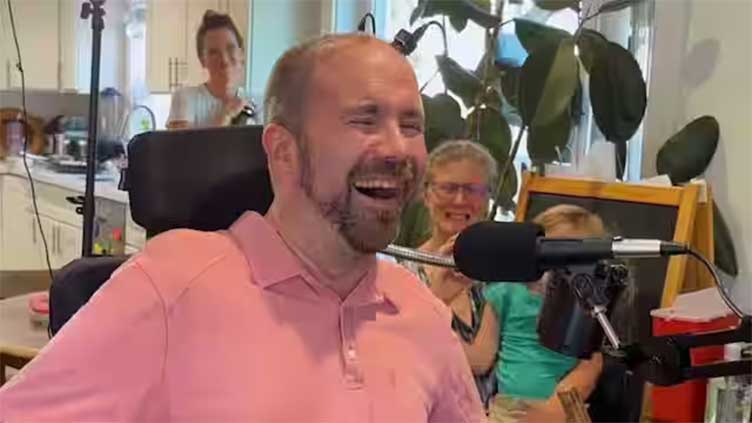Brain-computer helps man suffering from muscle degeneration disease speak again

WeirdNews
'He cried with joy, we all did'
(Web) - A man in the US who suffers from the muscle degeneration disease ALS was able to 'speak' using a brain-computer interface, offering hope to thousands of people who are unable to speak because of such conditions.
Casey Harrell, 45, used the brain-computer interface or BCI that interpreted his brain signals and turned them into text, which was then read by a computer, with 97 per cent accuracy, which makes this device the most accurate of its kind.
“Our BCI technology helped a man with paralysis to communicate with friends, families and caregivers,” said neurosurgeon David Brandman of University of California, Davis, where the experiment was conducted.
Brandman described it as "the most accurate speech neuroprosthesis (device) ever reported.”
Harrell used the system in both prompted and spontaneous conversational settings, a release from UC Davis said on Wednesday (Aug 15).
In both cases, speech decoding happened in real time, it said.
"The decoded words were shown on a screen and read aloud in a voice that sounded like Harrell’s before he had ALS. The voice was composed using software trained with existing audio samples of his pre-ALS voice," it said.
The 45-year's speech was hard to understand and he required others to help interpret for him.
For the experiment, sensors from the BCI were implanted in Harrel's brain in July 2023.
These included four microelectrode arrays inserted in the part of his brain responsible for coordinating speech, which could record brain activity from 256 cortical electrodes.
The researchers essentially 'recorded' him from the part of the brain that’s trying to send commands to the muscles.
"We are basically listening into that, and we’re translating those patterns of brain activity into a phoneme — like a syllable or the unit of speech — and then the words they’re trying to say,” said neuroscientist Sergey Stavisky. “We’re really detecting their attempt to move their muscles and talk.”
The brain signals are then interpreted by machine-learning programmes in the device.
WHY THIS IS A BREAKTHROUGH
The experiment offers hope for people who want to speak but can’t.
“Previous speech BCI systems had frequent word errors. This made it difficult for the user to be understood consistently and was a barrier to communication,” Brandman said.
“Our objective was to develop a system that empowered someone to be understood whenever they wanted to speak.”
"The first time we tried the system, he cried with joy as the words he was trying to say correctly appeared on-screen. We all did," said neuroscientist Sergey Stavisky who was part of the study.
“At this point, we can decode what Casey is trying to say correctly about 97 per cent of the time,” Brandman said.
“It has been immensely rewarding to see Casey regain his ability to speak with his family and friends through this technology,” said the study’s lead author, Nicholas Card.
WHAT IS ALS?
ALS is a progressive muscle degeneration disease. Also known as Lou Gehrig's disease, it inhibits the ability of nerve cells that control movement over a period of time, leading to the weakening of muscles.
Over time, patients become unable to stand, walk and use their hands.
In some cases, ALS can impair speech as it affects muscles and nerves that control speaking movements.


